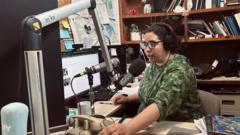As violence escalates in Syria, the Druze community feels increasingly vulnerable, caught between rising sectarian strife and a government struggling to ensure their protection. Local residents express fear and uncertainty about trust within and outside their community.
Druze in Syria Face Growing Insecurity Amid Sectarian Tensions

Druze in Syria Face Growing Insecurity Amid Sectarian Tensions
The Druze community grapples with increased violence and distrust due to rising sectarian tensions in post-war Syria, raising concerns about their future safety.
When gunfire erupted in the Damascus suburb of Ashrafiyat Sahnaya, Lama al-Hassanieh found herself trapped in her bathroom, her heart racing as she listened to extremists shouting threats against Druze residents. This is a community that has faced long-standing upheaval in Syria, and the stakes have never felt higher. Historically, the Druze—who practice a faith derived from Shia Islam—occupied a delicate position within the country's complex political landscape. Under former President Bashar al-Assad, many members of this minority group believed that loyalty to the regime would shield them from the chaos that consumed other sects during the protracted civil war.
In the aftermath of the conflict, however, the situation has changed dramatically. Druze communities have become targets for violence from Islamist militias following an increase in sectarian rhetoric. Most notably, a viral video of a student calling for revenge against the Druze marked the beginning of attacks on their neighborhoods, escalating tensions nationwide. A recent report by the Syrian Observatory for Human Rights outlines the severity of this violence: at least 137 lives lost in a matter of days, including civilians, security personnel, and Druze fighters.
As residents sought refuge in makeshift shelters, university students like Lama Zahereddine witnessed violence unfold around them. With close encounters to gunfire and chaos spilling into their academic institutions, many Druze students felt compelled to flee, unaware of their once-cordial classmates’ true sentiments. The pervasive fear of betrayal coupled with real threats has left the Druze community wary and distrustful.
While some Druze have organized to defend their communities, instances of violence continue to raise alarms. Hadi Abou Hassoun, a local Druze man, described an ambush while attempting to protect Ashrafiyat Sahnaya. Despite his injury, Abou Hassoun advocates for the rule of law to govern rather than religious ideology, reflecting a broader desire within the community for stability and safety.
With Israel conducting airstrikes near Druze-populated areas, ostensibly to protect this minority, the Druze community finds itself in an increasingly complicated web of alliances and hostilities. Trust in the Syrian government, however, remains tenuous, as many Druze members question their safety and rights amidst growing sectarian sentiment.
In the aftermath of violence, the mood in Ashrafiyat Sahnaya is tempered by apprehension. Lama al-Hassanieh echoes a sentiment echoed by many: "Where are the real steps? Where is the justice?" The Druze community's call for equal rights and accountability highlights the challenges they face in a changing Syria—one where the future is as precarious as the past has been violent.




















